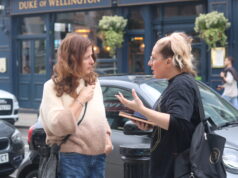


A scene from the Mercedes-Benz “No Limits” ad. MERCEDES-BENZ
Though its customer base in the United States historically has been one of the crustiest and most traditional, Mercedes-Benz keeps trying to shake old perceptions as it broadens its appeal. The brand’s latest experiential-marketing campaign — including giving Matchbox versions of a historic Mercedes-Benz to thousands of girls across the nation — tries to stir American gender stereotypes as it positions Mercedes-Benz as an exemplar of a new era.
The “No Limits” campaign is keyed to a two-minute video ad in which Mercedes-Benz questions girls’ self-perceptions even while it promotes the fact that the brand long has been associated with pioneering women. Young girls are seated at a table with a bunch of toys to choose from, and they predictably choose the doll and the tea pot instead of a tiny skateboard … or the Matchbox Mercedes. When questioned, they basically say they made those choices because they’re “girls’ toys” and refrained from picking the others because they’re “for boys.”
But let me show you something, the moderator says: a short video depicting Ewy Rosqvist, an Argentinian race-car driver, winning the nation’s Grand Prix in 1962 — by three hours over the nearest man; earlier, Mercedes-Benz had produced a short film about Roqvist’s stunning accomplishment. And it followed a recent video in which parent Daimler celebrated the fact that it was Bertha Benz, wife of the inventor of the automobile, who took the first wheeled contraption on a long-distance drive in Germany to prove the strange-looking contraption was a viable mode of transportation.
The girls in the “No Limits” ad shine after watching Rosqvist’s story on a tablet, and they take a second look at the Mattel Matchbox car — a die-cast version of the Mercedes-Benz 220SE driven by Rosqvist — in front of them. “Girls can be racers, too,” one girl concludes.
“Ewy’s story was an incredible story, and so we thought: ‘How do we pull it into a more contemporary format and make it as relevant today as when she won?'” Mark Aikman, general manager of marketing services for Mercedes-Benz USA, told me. “This was where the idea of inspiring girls in their most formative years came from. They’re capable of doing everything they set their minds to; they have no limits.”
The cars will be given by Mercedes-Benz and Mattel through a non-profit partner and sold in stores nationwide beginning next year. Proceeds from the sales will be used to make and distribute additional cars, and a teaching tool kit will be provided.
Aikman noted that, beyond these symbolic and marketing gestures, Mercedes-Benz also “loves to support girls going into STEM education” and that “there are already some extremely successful [female] change makers driving our products today.”
Of course, as Mercedes-Benz has hatched new entry-level models such as the CLA and A-Class sedans over the last few years, it’s been able to appeal to American GenX-ers and millennials with lower price points. Its extensive expansion into various new SUVs and crossovers also has made Mercedes-Benz more appealing and affordable to the new generation of parents of the children depicted in the “No Limits” ad and messaging.
The notion of challenging gender stereotyping has been catching on among auto marketers along with those in other verticals. During the last Super Bowl, for instance, Toyota aired a commercial starring Antoinette “Toni” Harris, a rising female collegiate football player.
And there are few industries — and consumer goods — where gender stereotypes have played a bigger historical and cultural role. That’s the reality Mercedes-Benz is trying to change.













